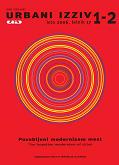Transformation of public space, from modernism to consumerism
Transformation of public space, from modernism to consumerism
Author(s): Boštjan BugaričSubject(s): Social Sciences
Published by: Urbanistični inštitut Republike Slovenije
Keywords: modernism; functionalism; public space; commercialization; city centre; city of consumption
Summary/Abstract: Public space in the contemporary city is undergoing changes because of economic and political interests and is often falling under private ownership. The programme in the city is developing on the basis of capital production, which was not foreseen in the modernistic scheme. Because the development programme is unsuitable, the city centre is becoming empty and the programme is migrating to a new form of urban structure – the city of consumption – being built in the suburbs. On the basis of the analysis of the historical development of Koper crucial moments, which contributed to the process of commercialization were defined. In the period of functionalism there existed a tendency to regulate social problems in the city, but no critical evaluation of eventual influence of capital on public space was established. Functionalism is historically associated with democratic orientation and social engagement, but through the course of history it became increasingly subjected to the interest of capital. This provided ideal basis for the hiperproduction of cities of consumption.
Journal: Urbani izziv
- Issue Year: 17/2006
- Issue No: 1-2
- Page Range: 173-176
- Page Count: 4
- Language: English

